Devotions on the Greek New Testament: 52 Reflections to Inspire and Instruct
Written by J. Scott Duvall and Verlyn D. Verbrugge, eds Reviewed By Clifford B. KvidahlA wise man once opined that there is no end to the publishing of books. Nowhere is this more clearly seen than when one happens to peruse the devotional aisle of a local Christian bookstore. Unfortunately, most of what fills the pages of today's devotionals is nothing more than some cute, pithy little saying that has little or no connection to Scripture. This is where Zondervan's new Devotions on the Greek New Testament (henceforth DGNT ) breaks the monotony of the uninspiring and breathes new life into the genre of devotional material. Now to be fair, DGNT is not for everyone; it will appeal only to those who have taken at least a year of Greek. But for students fresh out of first-year Greek, this will be a valuable tool in the battle to maintain an ability to read and understand Greek.
Edited by J. Scott Duvall and Verlyn D. Verbrugge, DGNT includes 52 devotions with samples from each of the NT books. Duvall and Verbrugge have put together a team of contributors to give devotional as well as grammatical insight into the Greek NT. The list of contributors reads like a who's who in the world of evangelical scholarship, containing both seasoned and up-and-coming scholars. Men and women like Craig Blomberg, Linda Belleville, Darrell Bock, Con Campbell, Lynn Cohick, Edward Klink, Scot McKnight, and Ben Witherington offer their expertise in the form of short, but informed grammatical, syntactical, and devotional insight into the Greek text of the NT.
The editors explain that their motivation behind DGNT is “to help students (and professors) keep their study of Greek a deeply Spiritual experience” (p. 11, emphasis original). Then the contributors begin-in canonical order-to offer their devotionals on select passages from the Greek NT. Each new devotional is clearly demarcated by a generously sized header containing the title of the devotional and the Scripture reference on which the devotional and grammatical comments are based. Next the Greek text is printed, making it helpful for those times when one may not have their Greek NT handy. This is followed by an average of one to two pages of insight on the Greek text.
Each of the contributors offers not only devotional notes but also grammatical notes that arise from the text in question. For example, in his devotional entitled “Luke 2:4-5: Mary and Joseph Travel to Bethlehem,” Verlyn Verbrugge notes the importance of participles and the need to pay attention to them:
The first one is á¼�μνηστευμÎνá¿� translated “the one pledged to be married.” This participle is preceded by the article, which makes it an attributive or adjectival participle. . . . The second participle is οá½�σá¿�. . . . This participle is not joined by καί to the first one, nor does it have its own article. It is therefore an adverbial or circumstantial participle, which denotes some adverbial idea, such as time, cause, concession, means, condition, or the like. (pp. 33-34)
Insights into the grammatical and syntactical nuance of the Greek text are invaluable to the student just getting his or her feet wet in the pool of Greek exegesis. Insight into lexicography, verbal aspect and tense, theology, and history make DGNT not only a useful tool for keeping up Greek, but also for keeping your mind and heart focused on the Savior.
It is hard to find fault with this incredibly invaluable resource. One could have wished that a glossary of unfamiliar words were included with the Greek text, similar to the one found in Zondervan's A Reader's Greek New Testament. But this is just a minor quibble that in no way takes away from the overall usefulness of this fine book.
So while it may be true to say that there is no end to publishing devotionals, one can lament the lack of books being published that engage not only the sentiment of the heart but the intellect of the mind as well. With DGNT, Zondervan has managed to publish a book that will challenge the Greek student to think deeply about the syntax and the Savior of the Greek NT.
Clifford B. Kvidahl
Clifford B. Kvidahl
Logos Bible Software
Bellingham, Washington, USA
Other Articles in this Issue
Some of the most valuable and lasting contributions made to the Christian faith have come through Christian scholarship...
Music, singing and emotions: what are the connections? The question is by no means new, but it’s certainly one that has received renewed attention in recent times...
In his influential address, “Discourse on the Proper Distinction between Biblical and Dogmatic Theology, and the Right Determination of the Aims of Each,” Johann Philipp Gabler (1753–1826) lodged the programmatic proposal that scholars ought to distinguish between biblical and systematic theology...
One of the most unnerving things you can read is John Milton’s great poem Paradise Lost...
Since The Intolerance of Tolerance was published, readers have been sending me new examples they have spotted-examples of egregious intolerance masquerading in the name of tolerance...







